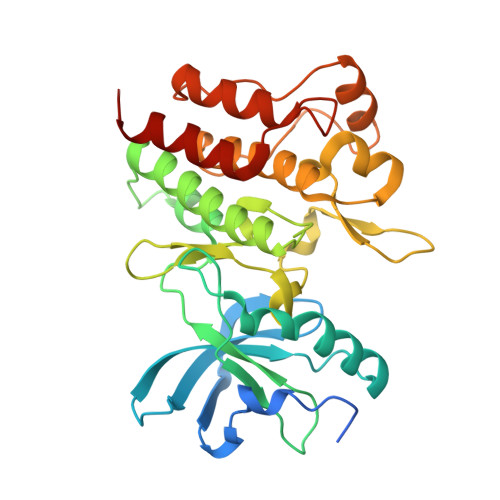Discovery of D6808, a Highly Selective and Potent Macrocyclic c-Met Inhibitor for Gastric Cancer Harboring MET Gene Alteration Treatment.
Wang, C., Li, J., Qu, L., Tang, X., Song, X., Yang, F., Chen, X., Lin, Q., Lin, W., Zhou, Y., Tu, Z., Chen, Y., Zhang, Z., Lu, X.(2022) J Med Chem 65: 15140-15164
- PubMed: 36355693
- DOI: https://doi.org/10.1021/acs.jmedchem.2c00981
- Primary Citation of Related Structures:
7Y4T, 7Y4U, 8GVJ - PubMed Abstract:
MET alterations have been validated as a driven factor in NSCLC and gastric cancers. The c-Met inhibitors, capmatinib, tepotinib, and savolitinib, are only approved for the treatment of NSCLC harboring exon 14 skipping mutant MET. We used a molecular hybridization in conjunction with macrocyclization strategy for structural optimization to obtain a series of 2-(2-(quinolin-6-yl)ethyl)pyridazin-3(2 H )-one derivatives as new c-Met inhibitors. One of the macrocyclic compounds, D6808, potently inhibited c-Met kinase and MET -amplified Hs746T gastric cancer cells with IC 50 values of 2.9 and 0.7 nM, respectively. It also strongly suppressed Ba/F3-Tpr-Met cells harboring resistance-relevant mutations (F1200L/M1250T/H1094Y/F1200I/L1195V) with IC 50 values of 4.2, 3.2, 1.0, 39.0, and 33.4 nM, respectively. Furthermore, D6808 exhibited extraordinary target specificity in a Kinome profiling against 373 wild-type kinases and served as a promising macrocycle-based compound for further anticancer drug development.
- International Cooperative Laboratory of Traditional Chinese Medicine Modernization and Innovative Drug Discovery of Chinese Ministry of Education (MOE), School of Pharmacy, Jinan University, #855 Xingye Avenue, Guangzhou 510632, China.
Organizational Affiliation:

















